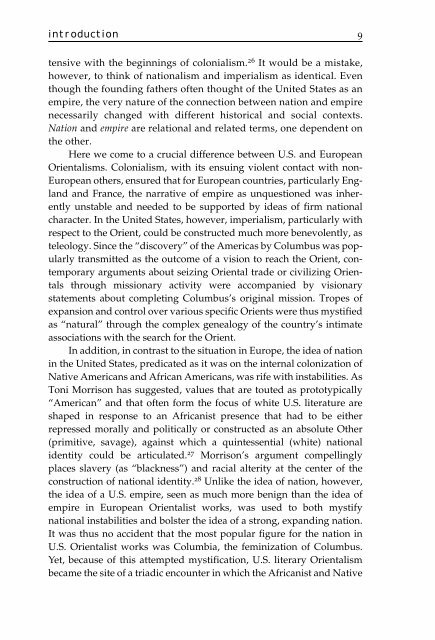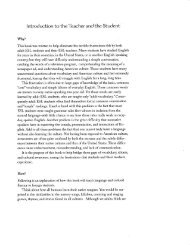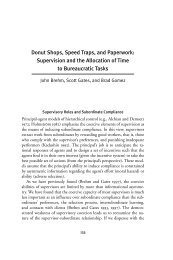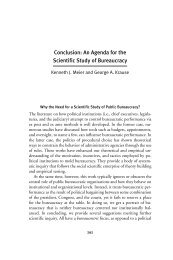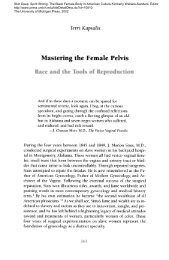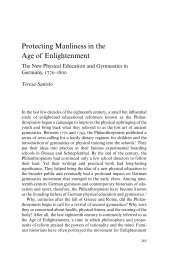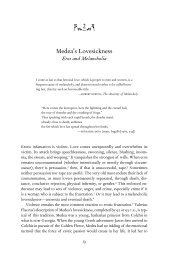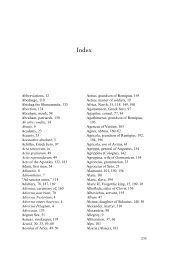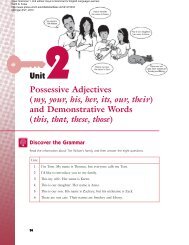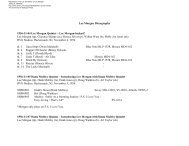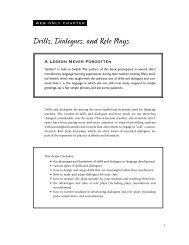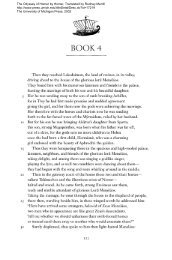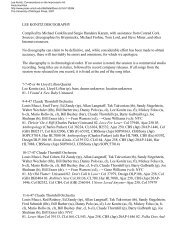Introduction - The University of Michigan Press
Introduction - The University of Michigan Press
Introduction - The University of Michigan Press
You also want an ePaper? Increase the reach of your titles
YUMPU automatically turns print PDFs into web optimized ePapers that Google loves.
introduction 9<br />
tensive with the beginnings <strong>of</strong> colonialism. 26 It would be a mistake,<br />
however, to think <strong>of</strong> nationalism and imperialism as identical. Even<br />
though the founding fathers <strong>of</strong>ten thought <strong>of</strong> the United States as an<br />
empire, the very nature <strong>of</strong> the connection between nation and empire<br />
necessarily changed with different historical and social contexts.<br />
Nation and empire are relational and related terms, one dependent on<br />
the other.<br />
Here we come to a crucial difference between U.S. and European<br />
Orientalisms. Colonialism, with its ensuing violent contact with non-<br />
European others, ensured that for European countries, particularly England<br />
and France, the narrative <strong>of</strong> empire as unquestioned was inherently<br />
unstable and needed to be supported by ideas <strong>of</strong> firm national<br />
character. In the United States, however, imperialism, particularly with<br />
respect to the Orient, could be constructed much more benevolently, as<br />
teleology. Since the “discovery” <strong>of</strong> the Americas by Columbus was popularly<br />
transmitted as the outcome <strong>of</strong> a vision to reach the Orient, contemporary<br />
arguments about seizing Oriental trade or civilizing Orientals<br />
through missionary activity were accompanied by visionary<br />
statements about completing Columbus’s original mission. Tropes <strong>of</strong><br />
expansion and control over various specific Orients were thus mystified<br />
as “natural” through the complex genealogy <strong>of</strong> the country’s intimate<br />
associations with the search for the Orient.<br />
In addition, in contrast to the situation in Europe, the idea <strong>of</strong> nation<br />
in the United States, predicated as it was on the internal colonization <strong>of</strong><br />
Native Americans and African Americans, was rife with instabilities. As<br />
Toni Morrison has suggested, values that are touted as prototypically<br />
“American” and that <strong>of</strong>ten form the focus <strong>of</strong> white U.S. literature are<br />
shaped in response to an Africanist presence that had to be either<br />
repressed morally and politically or constructed as an absolute Other<br />
(primitive, savage), against which a quintessential (white) national<br />
identity could be articulated. 27 Morrison’s argument compellingly<br />
places slavery (as “blackness”) and racial alterity at the center <strong>of</strong> the<br />
construction <strong>of</strong> national identity. 28 Unlike the idea <strong>of</strong> nation, however,<br />
the idea <strong>of</strong> a U.S. empire, seen as much more benign than the idea <strong>of</strong><br />
empire in European Orientalist works, was used to both mystify<br />
national instabilities and bolster the idea <strong>of</strong> a strong, expanding nation.<br />
It was thus no accident that the most popular figure for the nation in<br />
U.S. Orientalist works was Columbia, the feminization <strong>of</strong> Columbus.<br />
Yet, because <strong>of</strong> this attempted mystification, U.S. literary Orientalism<br />
became the site <strong>of</strong> a triadic encounter in which the Africanist and Native


